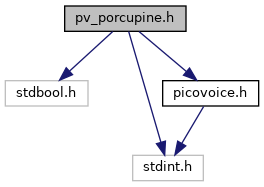

Go to the source code of this file.
Typedefs | |
| typedef struct pv_porcupine | pv_porcupine_t |
Functions | |
| PV_API void | pv_porcupine_delete (pv_porcupine_t *object) |
| PV_API int32_t | pv_porcupine_frame_length (void) |
| PV_API pv_status_t | pv_porcupine_get_min_memory_buffer_size (int32_t preliminary_memory_size, void *preliminary_memory_buffer, int32_t num_keywords, const int32_t *keyword_model_sizes, const void *const *keyword_models, int32_t *min_memory_buffer_size) |
| PV_API pv_status_t | pv_porcupine_init (const char *access_key, int32_t memory_size, void *memory_buffer, int32_t num_keywords, const int32_t *keyword_model_sizes, const void *const *keyword_models, const float *sensitivities, pv_porcupine_t **object) |
| PV_API pv_status_t | pv_porcupine_process (pv_porcupine_t *object, const int16_t *pcm, int32_t *keyword_index) |
| const PV_API char * | pv_porcupine_version (void) |
Typedef Documentation
◆ pv_porcupine_t
| typedef struct pv_porcupine pv_porcupine_t |
Forward declaration for Porcupine wake word engine. It detects utterances of given keywords within an incoming stream of audio in real-time. It processes incoming audio in consecutive frames and for each frame emits the detection result. The number of samples per frame can be attained by calling 'pv_porcupine_frame_length()'. The incoming audio needs to have a sample rate equal to 'pv_sample_rate()' and be 16-bit linearly-encoded. Porcupine operates on single-channel audio.
Definition at line 31 of file lib/mcu/psoc062s2/include/pv_porcupine.h.
Function Documentation
◆ pv_porcupine_delete()
| PV_API void pv_porcupine_delete | ( | pv_porcupine_t * | object | ) |
Destructor.
- Parameters
-
object Porcupine object.
◆ pv_porcupine_frame_length()
| PV_API int32_t pv_porcupine_frame_length | ( | void | ) |
Getter for number of audio samples per frame.
- Returns
- Frame length.
◆ pv_porcupine_get_min_memory_buffer_size()
| PV_API pv_status_t pv_porcupine_get_min_memory_buffer_size | ( | int32_t | preliminary_memory_size, |
| void * | preliminary_memory_buffer, | ||
| int32_t | num_keywords, | ||
| const int32_t * | keyword_model_sizes, | ||
| const void *const * | keyword_models, | ||
| int32_t * | min_memory_buffer_size | ||
| ) |
Computes the minimum required memory buffer size, in bytes, for the given keyword model. A relatively large value for 'preliminary_memory_buffer' is suggested (e.g., 30 kilobytes). Then, 'pv_porcupine_init' can be called optimally passing a memory buffer with the size of 'min_memory_buffer_size'.
- Parameters
-
preliminary_memory_size Memory size in bytes. preliminary_memory_buffer Memory needs to be 8-byte aligned. num_keywords Number of keywords to monitor. keyword_model_sizes Size of each keyword model in bytes. keyword_models Keyword models. [out] min_memory_buffer_size minimum required memory buffer size in bytes.
- Returns
- Status code. Returns 'PV_STATUS_INVALID_ARGUMENT', 'PV_STATUS_INVALID_STATE', or 'PV_STATUS_OUT_OF_MEMORY' on failure.
◆ pv_porcupine_init()
| PV_API pv_status_t pv_porcupine_init | ( | const char * | access_key, |
| int32_t | memory_size, | ||
| void * | memory_buffer, | ||
| int32_t | num_keywords, | ||
| const int32_t * | keyword_model_sizes, | ||
| const void *const * | keyword_models, | ||
| const float * | sensitivities, | ||
| pv_porcupine_t ** | object | ||
| ) |
Constructor.
- Parameters
-
access_key AccessKey obtained from Picovoice Console (https://console.picovoice.ai/). memory_size Memory size in bytes. memory_buffer Memory buffer needs to be 8-byte aligned. num_keywords Number of keywords to monitor. keyword_model_sizes Size of each keyword model in bytes. keyword_models Keyword models. sensitivities Sensitivities for detecting keywords. Each value should be a number within [0, 1]. A higher sensitivity results in fewer misses at the cost of increasing the false alarm rate. [out] object Constructed instance of Porcupine.
- Returns
- Status code. Returns 'PV_STATUS_INVALID_ARGUMENT' or 'PV_STATUS_OUT_OF_MEMORY' on failure.
◆ pv_porcupine_process()
| PV_API pv_status_t pv_porcupine_process | ( | pv_porcupine_t * | object, |
| const int16_t * | pcm, | ||
| int32_t * | keyword_index | ||
| ) |
Processes a frame of the incoming audio stream and emits the detection result.
- Parameters
-
object Porcupine object. pcm A frame of audio samples. The number of samples per frame can be attained by calling 'pv_porcupine_frame_length()'. The incoming audio needs to have a sample rate equal to 'pv_sample_rate()' and be 16-bit linearly-encoded. Porcupine operates on single-channel audio. [out] keyword_index Index of observed keyword at the end of the current frame. Indexing is 0-based and matches the ordering of keyword models provided to 'pv_porcupine_init()'. If no keyword is detected then it is set to -1.
- Returns
- Status code. Returns 'PV_STATUS_INVALID_ARGUMENT' or 'PV_STATUS_OUT_OF_MEMORY' on failure.
◆ pv_porcupine_version()
| const PV_API char* pv_porcupine_version | ( | void | ) |
Getter for version.
- Returns
- Version.